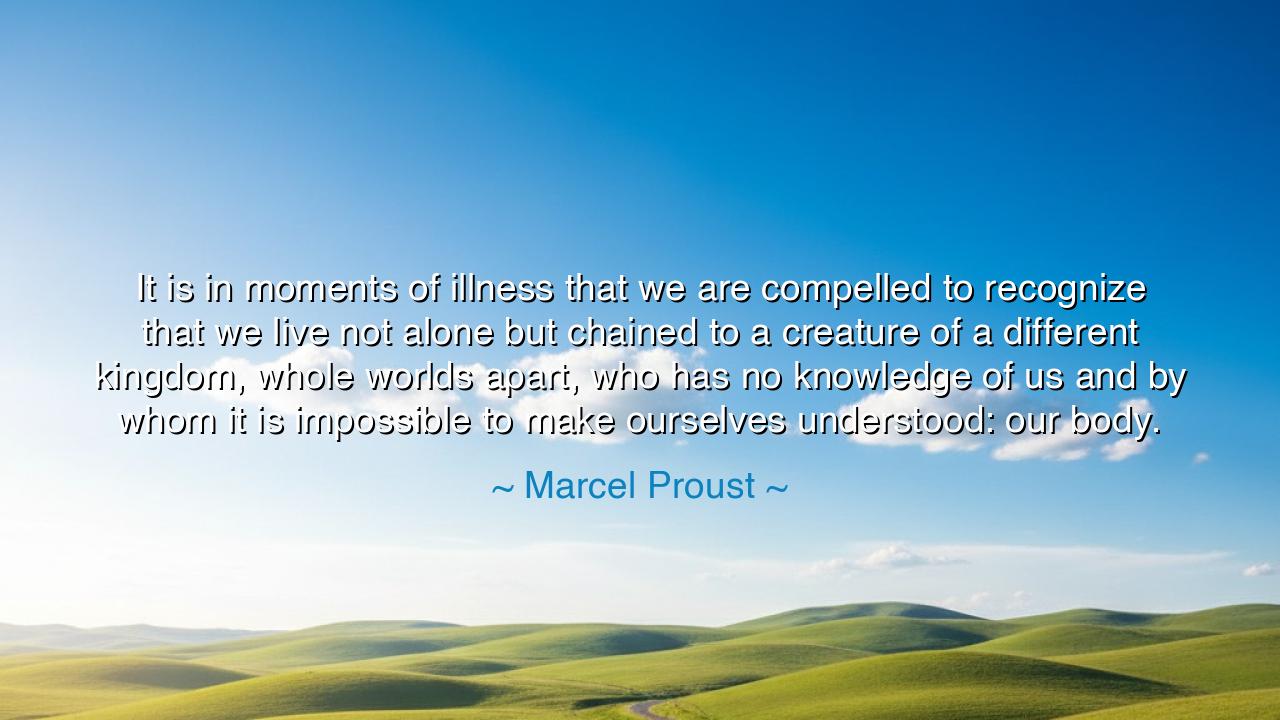
It is in moments of illness that we are compelled to recognize
It is in moments of illness that we are compelled to recognize that we live not alone but chained to a creature of a different kingdom, whole worlds apart, who has no knowledge of us and by whom it is impossible to make ourselves understood: our body.






"It is in moments of illness that we are compelled to recognize that we live not alone but chained to a creature of a different kingdom, whole worlds apart, who has no knowledge of us and by whom it is impossible to make ourselves understood: our body." These striking words by Marcel Proust offer a profound reflection on the nature of illness, suffering, and the disconnect between the mind and the body. Proust speaks to the unsettling truth that when we are unwell, we are suddenly and acutely aware of our bodily limitations—a realization that we, as conscious beings, are bound to a physical form that is both ours and yet separate from us. The body becomes a stranger, one that we cannot always control or understand, a mysterious force that can betray us without warning.
In this reflection, Proust touches upon a truth that has been recognized by many ancient thinkers. The Greeks, particularly Socrates and Plato, often spoke of the tension between the soul and the body, two entities that are bound together yet fundamentally distinct. Socrates, in his dialogues, often suggested that the body is a temporary vessel for the soul, which strives to rise above the physical and connect with the divine and eternal. Yet, the body—an imperfect and fragile vessel—reminds us of our human limitations, especially in times of illness. As Plato wrote in The Phaedo, the body is a source of distraction and suffering, and true wisdom is only attained when the soul is freed from its physical constraints. Proust, much like the philosophers of old, highlights this existential struggle: the body, while a part of us, is not always in harmony with the mind or spirit.
Consider the life of Friedrich Nietzsche, a philosopher who spent much of his life grappling with physical illness. Nietzsche’s body betrayed him, leaving him bedridden for long periods, often in intense pain. His writings, particularly in works like Thus Spoke Zarathustra, reflect this struggle with the body—a body that he could not escape from, despite his intellectual and spiritual pursuits. Nietzsche, much like Proust, was forced to confront the alienness of the body in the moments when his mind was willing but his body was incapable. His experience echoes Proust’s idea that in illness, we come face-to-face with the otherness of the body, a kingdom that operates according to its own laws, indifferent to our wishes.
Proust’s quote also speaks to the disconnect between the self and the body. In moments of health, we might take our body for granted, assuming that it will cooperate with our wants and needs. But when illness strikes, we are reminded that the body is not simply an extension of the mind, but a separate entity with its own rules. In the ancient wisdom of the Buddha, there is an understanding that the body is impermanent, subject to sickness, decay, and death. The Buddha teaches that attachment to the body—viewing it as a permanent or reliable part of the self—leads to suffering. Just as Proust describes, the body can seem like a stranger, a separate being that moves to its own rhythm, unaware of our desires or understanding.
The lesson of Proust’s words is one of humility and acceptance. In times of illness, we are forced to recognize the fragility of the human form. The body, though intimately ours, operates according to its own laws, which we cannot fully control. Our health is often a gift we take for granted, but when we are ill, we are reminded of our vulnerability. Illness, then, becomes a powerful reminder that we are not masters of our bodies; we are guests in this physical form, and our existence in this world is temporary. Just as the Stoics taught, we must learn to accept the body’s limitations, and to focus not on controlling it, but on understanding its role in our journey. When we accept the body’s impermanence, we can free ourselves from the suffering of resisting what we cannot change.
In practical terms, Proust’s insight invites us to reflect on how we view and treat our bodies. In a world that often idolizes physical perfection and youth, it is easy to forget that our bodies are frail, finite, and ultimately beyond our control. We must learn to honor and care for our bodies without becoming overly attached to them. Physical health should be valued, but we must also remember that our inner lives—our minds, spirits, and souls—are equally important. In moments of illness, instead of resisting the discomfort or sorrow, we can embrace it as an opportunity to reconnect with our inner selves. This is the true power of solitude and suffering—to turn inward and discover the strength that exists within, despite the limitations of the body.
Finally, Proust’s words suggest that illness, though painful, is an opportunity for self-reflection and growth. It reminds us that, though we may live in a physical body, we are not defined solely by that body. Our true selves—our thoughts, emotions, passions, and dreams—lie beyond the physical form. In this sense, suffering becomes a reminder that the soul and the mind are greater than the body. The more we acknowledge the separation between the body’s needs and the soul’s desires, the more we can live in peace with our limitations, knowing that the essence of who we are cannot be diminished by physical suffering. We can, therefore, find meaning in our solitude and suffering, using these moments to reconnect with the timeless aspects of our being.






AAdministratorAdministrator
Welcome, honored guests. Please leave a comment, we will respond soon